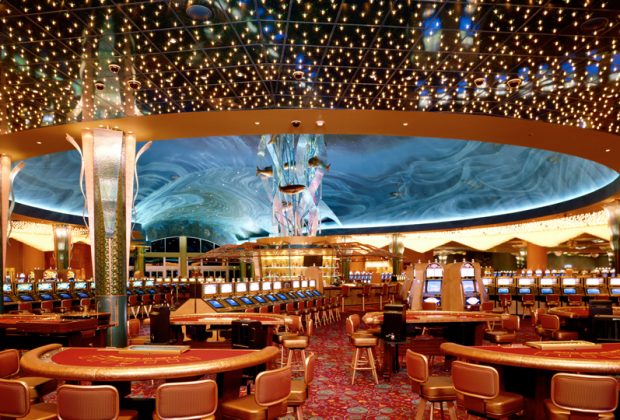
Casino games have long captured the fascination of people around the planet, becoming an integral part of both leisure and tradition. From the glimmering lights of Nevada to the captivating experience of internet gambling, these activities evoke thrill, uncertainty, and sometimes even a sense of remembrance. They are beyond just hobbies; they have woven themselves into the texture of society, influencing everything from film and melodies to fashion and writing.
The allure of casino games transcends the gambling aspect, tapping into broader themes of fortune, possibility, and human behavior. bakar69 As players convene around a poker table or rotate the roulette, they engage in an timeless ritual that connects with our communal desire for adventure and unpredictability. This fascination has led to the rise of numerous references in films, music, and video games, showcasing how strongly entrenched these activities are in pop culture. Whether it is the pressure of a traditional heist movie or the colorful nightlife portrayed in videos, casino games have established a substantial role that reflects our bond with risk.
Social Impact of Casino Games
Casino activities have played a pivotal role in cultural contexts throughout history. Originating from old societies, forms of chance were often connected to rituals or events. For instance, early forms of gambling can be linked back to historic Chinese and the Roman Empire, where dice games and wagering on outcomes were popular pastimes. These activities not only served as entertainment but also as methods of connecting people, facilitating connections among people within communities.
As societies evolved, so did the sophistication and structure of casino games. The establishment of official casinos in the 17th century, particularly in Italy, marked a major shift in how games were perceived and organized. With specific spaces for gambling, the casino became a community center where people from different backgrounds gathered. This change contributed to the validation of the industry, transforming it from a mere pastime into an organized industry that influenced economy and policy.
The effect of casino games on mainstream culture cannot be understated. As they were brought into the limelight in literature and film, games such as poker and 21 became symbols of chance, luck, and tactics. Famous characters and stories have developed around these games, illustrating societal attitudes towards luck, wealth, and vice. This fascination with gambling games has infiltrated various forms of entertainment, solidifying their status in the public imagination and linking them to wider cultural stories throughout the ages.
Depiction of Gambling Activities in Entertainment
Gambling games have long been a popular topic in various forms of media, reflecting both the thrill and complexities of gambling culture. Films such as Ocean’s 11 and Casino Royale portray individuals who navigate dangerous scenarios, showcasing not only the attractiveness of the gambling environment but also the strategies and decisions that come with playing popular games like Texas Hold’em and blackjack. These movies often dramatize the excitement of winning and the potential repercussions of losing, encapsulating the perils involved in gambling.
Television shows have also explored the universe of casino games, often integrating them into the storyline as a context for character arcs and drama. Series like Las Vegas depict the stories of casino workers and casino-goers, highlighting the dynamic, often tumultuous energy of the casino floor. Reality shows featuring high-stakes betting contests further emphasize the appeal of casino games, drawing viewers into the excitement and strategy involved in each game. Through these depictions, media not only engages but also sparks conversations about luck, skill, and the essence of chance.
Video games have increasingly incorporated casino games into their development, allowing players to recreate the feeling of betting without financial exposure. Games within the realm of online gaming often include virtual slots, online poker, and other casino favorites, creating an interactive experience that mirrors actual casino experiences. These virtual portrayals make casino games accessible to a global audience, appealing to both gamblers and those who enjoy the thrill of simulation. As a consequence, the representation of casino games in entertainment continues to shape cultural attitudes and cultural relevance, highlighting their function in entertainment and culture.
Effect of Gambling Activities on Society
Casino games have a meaningful impact on communities, affecting multiple aspects of societal norms and interpersonal behavior. They often serve as a venue for social interaction, where people gather to enjoy a common activity. Casino trips with friends or trips to casinos become social activities that foster connections and create shared moments. This collective aspect boosts the entertainment value of casino games, making them a favored choice for celebrations and leisure activities.
Additionally, gambling activities have been portrayed in countless films, television shows, and written works, influencing views and attitudes towards gaming and betting. Icons like James Bond playing baccarat or the intense poker scenes in films have embedded these games in the shared imagination. This depiction often idealizes the lifestyle associated with gambling, attracting new players and impacting trends in both style and behavior. These portrayals can spark curiosity and lead to a more profound investigation of the intricacies of gambling.
Nonetheless, there are also adverse implications linked to the widespread appeal of casino games. The temptation of quick monetary gain can lead to problem gambling and economic troubles for some individuals. The community must grapple with these issues, promoting responsible gambling and education of the dangers involved. Finding a balance between the fun aspect of casino games with the risks is crucial to ensure that they continue to be a beneficial aspect of our cultural landscape.
